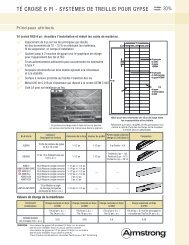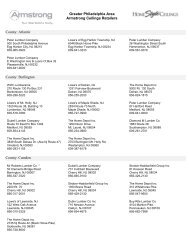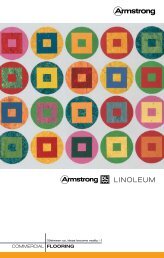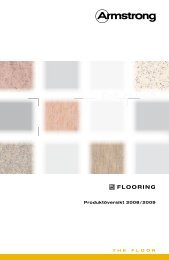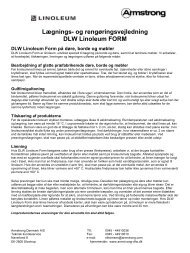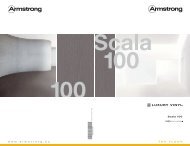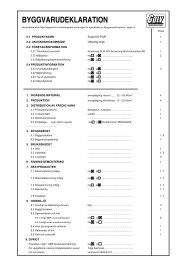LEED Initiatives by State/County/City - Armstrong
LEED Initiatives by State/County/City - Armstrong
LEED Initiatives by State/County/City - Armstrong
Create successful ePaper yourself
Turn your PDF publications into a flip-book with our unique Google optimized e-Paper software.
<strong>LEED</strong> ® <strong>Initiatives</strong> in Governments and Schools<br />
Updated: 12/14/05<br />
To update list, contact:<br />
Allison Herren<br />
Chapter Coordinator<br />
202-828-1148<br />
aherren@usgbc.org<br />
For the most updated list of initiatives, please see www.usgbc.org/resources -<strong>State</strong> and Local Government.<br />
FEDERAL INITIATIVES:<br />
DOE: The Department of Energy supported the development of the <strong>LEED</strong><br />
Rating System, training workshops, and reference materials.<br />
Contact: Mark Ginsburg; 202-586-1394<br />
mark.ginsberg@ee.doe.gov<br />
DOI: The Department of the Interior has signed a Memorandum of<br />
Understanding with the USGBC supporting the use of <strong>LEED</strong> for Existing<br />
Buildings <strong>by</strong> its facilities. The DOI has also signed a memorandum with<br />
the GSA and the USGBC supporting <strong>LEED</strong> for all partnered projects.<br />
Contact: Heather S. Davies; heather_davies@ios.doi.gov<br />
EPA: The Environmental Protection Agency aims to have all of their new<br />
facility construction and new building acquisition projects 20,000 gsf or<br />
larger meet <strong>LEED</strong> Silver standard <strong>by</strong> 2005. The Agency also aims to use<br />
<strong>LEED</strong> for new Commercial Interiors and Existing Building standards <strong>by</strong><br />
2005 on at least one appropriate project where space in an existing<br />
building is acquired. The Agency currently has multiple projects<br />
registered for <strong>LEED</strong>-NC certification and is supporting development of<br />
<strong>LEED</strong> for Existing Buildings. The Agency will request that GSA provide<br />
new major office leases that meet the Energy Star requirements.<br />
EPA's Chelmsford, MA lab is the first Gold-rated federal building.<br />
http://www.epa.gov/greeningepa/<br />
EPA's Green Buildings Vision and Policy <strong>State</strong>ment:<br />
http://www.epa.gov/oaintrnt/projects/policy.htm<br />
Contact: Cathy Berlow, (202) 564-3739<br />
berlow.cathy@epa.gov<br />
<strong>LEED</strong> <strong>Initiatives</strong> in Governments and Schools<br />
U.S. Green Building Council<br />
December 2005<br />
1
GSA: The General Services Administration requires that all building projects<br />
starting design in 2003 meet <strong>LEED</strong> Certified level standards with a target<br />
of <strong>LEED</strong> Silver. To support this policy, the GSA has signed a<br />
Memorandum of Understanding with the Department of the Interior and<br />
USGBC supporting the use of <strong>LEED</strong> on all new partnered (GSA-DOI)<br />
projects. The GSA strongly encourages projects to apply for certification.<br />
The department has more than 20 projects registered including federal<br />
courthouses, laboratories, border stations, and office buildings. The GSA<br />
is the nation's largest landlord, managing space in over 8,000 owned and<br />
leased buildings for over one million federal employees. GSA was the<br />
Council's first federal member and is currently supporting the<br />
development of <strong>LEED</strong> for Commercial Interiors.<br />
Contact: Don Horn; donald.horn@gsa.gov<br />
<strong>State</strong>: The Department of <strong>State</strong> has committed to using <strong>LEED</strong> on the<br />
construction of new embassies worldwide over the next 10 years and has<br />
worked with the USGBC to coordinate a green charrette for the project<br />
teams in early 2001. The Department has several project registered for<br />
<strong>LEED</strong> certification and are aiming to certify three <strong>by</strong> the summer or fall of<br />
2003.<br />
Contact: Donna McIntire; (703) 875-5336<br />
Air Force: The Air Force has developed a <strong>LEED</strong> Application Guide for Lodging<br />
projects and has conducted <strong>LEED</strong> training seminars for its design and<br />
construction personnel. The Air Force encourages the use of <strong>LEED</strong> for<br />
new or major renovations for MILCON projects and has created an online<br />
design guide for sustainable development structured after <strong>LEED</strong>. An<br />
online Sustainable Training course is also being developed.<br />
The Physical Fitness Center at Barksdale AFB in Louisiana earned <strong>LEED</strong><br />
1.0 Bronze certification in December 2002.<br />
Contact: Boyce Bourland; (210) 536-5483<br />
The Sustainable Development Guide:<br />
http://www.afcee.brooks.af.mil/dc/dcd/arch/rfg/index.html<br />
The <strong>LEED</strong> Application Guide for Lodging:<br />
http://www.afcee.brooks.af.mil/dc/DCD/arch/leed/leedguide.pdf<br />
The Air Force Policy Letter for Sustainable Development:<br />
http://www.afcee.brooks.af.mil/green/resources/policymemo.pdf<br />
<strong>LEED</strong> <strong>Initiatives</strong> in Governments and Schools<br />
U.S. Green Building Council<br />
December 2005<br />
2
Army: The Army has adopted <strong>LEED</strong> into its Sustainable Project Rating Tool<br />
(SPiRiT), but is not requiring certification of its projects. All buildings<br />
built in the Fiscal Year 2004 (October 1-September 31) must have a<br />
Bronze rating; FY2005- Silver; FY2006 Gold SpiRiT rating.<br />
Contact: Richard Schneider, U. S. Army Engineering Research &<br />
Development Center; 217-373-6752<br />
r-schneider@cecer.army.mil<br />
Construction Engineering Research Laboratory:<br />
http://www.cecer.army.mil/SustDesign<br />
Navy: The Navy was the first federal agency to certify a <strong>LEED</strong> project. The<br />
Bachelor Enlisted Quarters at the Great Lakes Naval Training Center was<br />
certified under the Pilot version 1.0 of <strong>LEED</strong>. The Navy continues to<br />
pursue sustainable development in its facilities requiring all applicable<br />
projects to meet the <strong>LEED</strong> Certified level, unless justifiable conditions<br />
exist that limit accomplishment of the <strong>LEED</strong> credits necessary for<br />
achieving the Certified level. Submission to the USGBC for <strong>LEED</strong><br />
certification is not a requirement, but is recommended for high visibility<br />
and showcase projects. The Navy uses the <strong>LEED</strong> Green Building Rating<br />
System as a tool in applying sustainable development principles and as a<br />
metric to measure the sustainability achieved. The Navy has provided<br />
support for the development of the <strong>LEED</strong> for Residential Construction<br />
and participates in the <strong>LEED</strong> Existing Buildings and Multiple Buildings<br />
committees.<br />
Contact: Dennis Talton, R.A.; (757) 322-4211<br />
taltondo@efdlant.navfac.navy.mil<br />
<strong>LEED</strong> <strong>Initiatives</strong> in Governments and Schools<br />
U.S. Green Building Council<br />
December 2005<br />
3
STATE INITIATIVES:<br />
Arizona: On Friday, Feb 11, 2005, Governor Janet Napolitano signed Executive<br />
Order #2005-05 requiring all state-funded buildings to achieve <strong>LEED</strong><br />
Silver certification. The Executive Order also requires newly constructed<br />
state-funded buildings to incorporate renewable energy. This makes the<br />
state the first governmental entity in Arizona to adopt a mandatory green<br />
building standard.<br />
Executive Order: http://www.governor.state.az.us/eo/2005_05.pdf<br />
Contact: Mick Dalrymple, Desert Moon Productions, Inc. (602) 321-7265;<br />
md@desertmooninc.com.<br />
Arkansas: Governor Mike Huckabee signed Act 1770 in July 2005 encouraging all<br />
state agencies to use green design strategies, including <strong>LEED</strong>. The bill<br />
also creates a "Legislative Task Force on Sustainable Building Design &<br />
Practices" which is to meet and continue to review, discuss and advise on<br />
issues related to sustainable building design.<br />
Contact: Mark Robertson, MESA Landscape Architects, Inc., (501) 372-<br />
6092;<br />
marobertson@mesainc.net<br />
Martha Jane Murray, The Wilcox Group, (501) 666-4546;<br />
mmurray@thewilcoxgroup.com<br />
California: Governor Schwarzeneggar signed Executive Order #S-20-04 on December<br />
14, 2004, requiring all new and renovated state-owned facilities to be<br />
<strong>LEED</strong> Silver.<br />
Executive Order:<br />
http://www.governor.ca.gov/state/govsite/gov_htmldisplay.jsp?sCatTitle=<br />
Exec+Order&sFilePath=/govsite/executive_orders/20041214_S-20-<br />
04.html&sTitle=Executive+Order+S-20-04<br />
Contact: Dan Burgoyne, <strong>State</strong> of California, Department of General<br />
Services; (916) 376-5010<br />
daniel.burgoyne@dgs.ca.gov<br />
Colorado: On July 15, 2005, Governor Owens signed Executive Order # D005 05<br />
adopting <strong>LEED</strong>-EB and incorporating <strong>LEED</strong>-NC practices for all state<br />
buildings. The order also creates a Colorado Greening Government<br />
Coordinating Council to develop and implement conservation policies.<br />
Executive Order: http://www.colorado.gov/governor/eos/d00505.pdf<br />
<strong>LEED</strong> <strong>Initiatives</strong> in Governments and Schools<br />
U.S. Green Building Council<br />
December 2005<br />
4
Contact: Linda Smith, Governor's Office of Energy Management &<br />
Conservation; 303-866-2264<br />
Linda.Smith2@state.co.us<br />
Connecticut: Proposed Bill #923 was introduced in January 2005 requiring any new<br />
state-funded construction to achieve <strong>LEED</strong> Silver certification. The bill<br />
was passed <strong>by</strong> the Senate on June 7, 2005, and is currently being reviewed<br />
<strong>by</strong> the House.<br />
http://www.cga.ct.gov/asp/cgabillstatus/cgabillstatus.asp?selBillType=Bill<br />
&bill_num=923&which_year=2005&SUBMIT.x=19&SUBMIT.y=13<br />
Contact: Bob Maddox; (203) 266-7973<br />
bmaddox@sterlingplanet.com<br />
Illinois: The <strong>State</strong> of Illinois Capital Development Board is considering requiring<br />
<strong>LEED</strong> certification of public projects.<br />
Contact: Ron Wright, <strong>State</strong> of Illinois Capital Development Board;<br />
rwright@cdb.state.il.us<br />
Maine: Governor John Baldacci issued an Executive Order in November 2003<br />
directing all new or expanding state buildings to incorporate <strong>LEED</strong><br />
guidelines provided that standards can be met on a cost-effective basis.<br />
Contact: Wendy Porter; (207) 876-3331<br />
Maryland: Maryland’s governor issued an Executive Order in October 2001 calling<br />
for all capital projects greater than 5,000 gsf to earn <strong>LEED</strong> certification.<br />
The House and Senate passed legislation in April 2005 requiring a green<br />
building standard, such as <strong>LEED</strong> (Silver), be used for state capital<br />
projects.<br />
http://mlis.state.md.us/2005rs/billfile/hb0196.htm<br />
The state also approved a green building tax credit for commercial<br />
developers:<br />
http://business.marylandtaxes.com/taxinfo/taxcredit/greenbldg/default.asp<br />
MD Green Building Council contacts:<br />
Sean McGuire, Environmental Design; (410) 260-8727<br />
www.dnr.state.md.us/ed<br />
Steve Gilliss, MD Dept. of General Services; (410) 767-4675<br />
sgilliss@dgs.state.md.us<br />
<strong>LEED</strong> <strong>Initiatives</strong> in Governments and Schools<br />
U.S. Green Building Council<br />
December 2005<br />
5
Massachusetts: Massachusetts is considering <strong>LEED</strong> adoption for all state projects as well<br />
as a green building tax credit program.<br />
Contact: John DiModica, Dept. of Capital Planning; (617) 727-4030<br />
John.DiModica@dcp.state.ma.us<br />
Barbra Batshalom, The Green Roundtable; (617) 374-3740<br />
bb@greenroundtable.org<br />
Michigan: On April 22, 2005, Governor Granholm signed Executive Order #2005-4<br />
requiring all state-funded new construction and major renovation projects<br />
over $1,000,000 to be <strong>LEED</strong> certified.<br />
Executive Order: http://www.michigan.gov/gov/0,1607,7-168-<br />
21975_22515-116177--,00.html<br />
New Jersey: Governor James E. McGreevey signed Executive Order # 24 in July 2002<br />
requiring all new school designs to incorporate <strong>LEED</strong> guidelines. The<br />
New Jersey Economic Schools Construction Corporation is encouraging<br />
the use of <strong>LEED</strong> but not requiring certification of new projects built under<br />
its $12 billion public school construction program.<br />
Executive Order: www.state.nj.us/infobank/circular/eom24.htm<br />
Contact: Ted Huesing; (908) 281-5385<br />
New York: New York Governor Pataki issued Executive Order #111 in June 2001<br />
encouraging but not requiring state projects to seek <strong>LEED</strong> Certification.<br />
New York <strong>State</strong> Energy Research and Development Authority will be<br />
offering an incentive for design teams of any New York <strong>State</strong> building that<br />
achieves a <strong>LEED</strong> rating. NYSERDA’s New Construction Program offers<br />
a 10% increase on incentives for energy efficiency measures that reduce<br />
the use of electricity. NYSERDA provides low interest loans (4% below<br />
market rate) for energy efficiency measures and building materials that<br />
meet <strong>LEED</strong> or other generally accepted green building standards.<br />
The New York <strong>State</strong> Green Building Tax Credit Program provides a tax<br />
incentive to commercial developments incorporating specific green<br />
strategies informed <strong>by</strong> <strong>LEED</strong>.<br />
New York Green Building Tax Incentive Program:<br />
http://www.dec.state.ny.us/website/ppu/grnbldg/index.html<br />
The New York Executive Order, Green and Clean <strong>State</strong> Buildings and<br />
Vehicles: http://www.nyserda.org/programs/exorder111.asp<br />
<strong>LEED</strong> <strong>Initiatives</strong> in Governments and Schools<br />
U.S. Green Building Council<br />
December 2005<br />
6
Contact: Craig Kneeland, NYSERDA; (518) 862-1090 ext. 3311<br />
cek@nyserda.org<br />
Nevada: On June 17, 2005 Governor Guinn signed AB3 requiring all state funded<br />
buildings be <strong>LEED</strong> Certified or higher in accordance with <strong>LEED</strong> or an<br />
equivalent standard. During each biennium, at least two occupied public<br />
buildings whose construction will be sponsored or financed <strong>by</strong> the <strong>State</strong> of<br />
Nevada must be designated as a demonstration project and be equivalent<br />
to a <strong>LEED</strong> Silver or higher certification, or an equivalent standard. The<br />
bill also provides tax abatements for property which has an eligible <strong>LEED</strong><br />
Silver building and tax exemptions for products or materials used in the<br />
construction of a <strong>LEED</strong> Silver building.<br />
www.leg.state.nv.us/22ndSpecial/Reports/history.cfm?ID=2546<br />
Contact: Lance Kirk, Lucchesi Galati Architects; (702) 263-7111<br />
ljkirk@lgainc.com<br />
Oregon: Oregon's 35% Business Energy Tax Credit for sustainable buildings is tied<br />
to the <strong>LEED</strong> certification level achieved. A <strong>LEED</strong> Silver rating is the<br />
minimum standard to obtain the tax credit for sustainable buildings and<br />
applies to <strong>LEED</strong> NC, CI, and CS certified buildings.<br />
Examples:<br />
100,000 sf. <strong>LEED</strong>-NC Silver bldg. eligible for $140,000 tax credit<br />
100,000 sf. <strong>LEED</strong>-NC Gold bldg. eligible for $177,485 tax credit<br />
http://www.energy.state.or.us/bus/tax/sustain.htm<br />
Contact: Ann Grim, Oregon Office of Energy; (503) 378-4912<br />
Pennsylvania: In July 2005, the Pennsylvania legislature passed House Bill 628,<br />
amending the Public School Code to provide a financial incentive to<br />
public school districts that achieve <strong>LEED</strong> Silver certification.<br />
http://www2.legis.state.pa.us/WU01/LI/BI/BT/2005/0/HB0628P2564.pdf<br />
Buildings currently under construction on behalf of the Department of<br />
Environmental Protection and the Department of Conservation and<br />
Natural Resources are seeking <strong>LEED</strong> Silver certification.<br />
Four state funds including the $20 million Sustainable Energy Fund<br />
provide grants, loans and "near-equity" investments in energy efficiency<br />
and renewable energy projects in Pennsylvania.<br />
Contact: Catherine Brownlee, Governor’s Green Government Council;<br />
(717) 772-8946<br />
cbrownlee@state.pa.us<br />
<strong>LEED</strong> <strong>Initiatives</strong> in Governments and Schools<br />
U.S. Green Building Council<br />
December 2005<br />
7
Rhode Island: On August 22, 2005, Governor Donald Carcieri signed Executive Order #<br />
05-14 requiring all new constructions and renovations of public buildings<br />
to meet <strong>LEED</strong> Silver certification or higher.<br />
Executive Order:<br />
http://www.governor.state.ri.us/executiveorders/2005/14_NewBuildings_<br />
Energy_Environmental_Standards.pdf<br />
Washington: On April 8, 2005, Gov. Christine Gregoire signed into law ESSB 5509<br />
requiring state-funded projects over 5,000 sq ft, including school district<br />
buildings, to achieve <strong>LEED</strong> Silver certification. Washington is the first<br />
state in the country to adopt <strong>LEED</strong> legislation.<br />
ESSB 5509: http://www.leg.wa.gov/pub/billinfo/2005-<br />
06/Htm/Bills/Senate%20Passed%20Legislature/5509-S.PL.htm<br />
The Dept. of Corrections has made <strong>LEED</strong> Silver a requirement and<br />
certification is also required for buildings down to 5,000 sq ft.<br />
Community Colleges, Dept. of General Administration, The Evergreen<br />
<strong>State</strong> College, and several other smaller agencies have made <strong>LEED</strong> Silver<br />
the standard for design and construction, however certification is not<br />
required.<br />
New Energy Life Cycle Cost Analysis Guidelines (ELCCA) went into<br />
affect January 2005 requiring that all new and remodeled public projects<br />
over 25,000 sq ft in Washington <strong>State</strong> analyze a <strong>LEED</strong> Silver building * as<br />
part of this process. This includes completing and submitting a <strong>LEED</strong> *<br />
Scorecard during schematic design that reflects a <strong>LEED</strong> * Silver building.<br />
This is one of the submittals required under the mandatory ELCCA<br />
process.<br />
* or equivalent rating system as approved <strong>by</strong> WA <strong>State</strong> Dept. of General Administration.<br />
Department of General Administration green building webpage:<br />
www.ga.wa.gov/eas/green<br />
Contact: Stuart Simpson, Green Building Advisor, Dept. of General<br />
Administration;<br />
(360) 902-7199<br />
Ssimpso@GA.WA.GOV<br />
Glen Gilbert, Cascadia Region Green Building Council;<br />
(503) 228-5533<br />
Glen@CascadiaGBC.org<br />
<strong>LEED</strong> <strong>Initiatives</strong> in Governments and Schools<br />
U.S. Green Building Council<br />
December 2005<br />
8
MUNICIPAL INITIATIVES:<br />
Acton, MA: A new zoning <strong>by</strong>-law (section 5.5B.2.2.d) unanimously adopted at the<br />
Annual Town Meeting on April 5, 2004 gives a density bonus for<br />
buildings achieving <strong>LEED</strong> certification.<br />
Zoning Bylaw: http://doc.acton-ma.gov/dsweb/Get/Document-<br />
8253/EAVPC+Articles+Presented+at+Town+Meeting+-+April+2004.pdf<br />
Contact: Acton Planning Department, planning@acton-ma.gov<br />
Alameda<br />
<strong>County</strong>, CA: All county projects initiated after July 1, 2003 must be <strong>LEED</strong> “Silver”<br />
certified. This ordinance added chapter 4.38 to Title 4 of the<br />
Administrative Code of the <strong>County</strong> of Alameda.<br />
Contact: Michael Cadrecha, Architect, <strong>County</strong> of Alameda GSA-TSD;<br />
(510) 208-9589<br />
michael.cadrecha@acgov.org.<br />
Albuquerque, NM: Mayor Martin Chavez signed an Executive Order on March 28, 2005<br />
establishing high performance green building standards. All city-funded<br />
projects 5,000 ft 2 and above and/or using over 50 KW electrical demand<br />
must meet a minimum rating of <strong>LEED</strong> Silver certification. This includes<br />
<strong>LEED</strong>-NC, <strong>LEED</strong>-EB, <strong>LEED</strong>-CS, or <strong>LEED</strong>-CI rating system.<br />
Arlington, MA: In May 2003, the town of Arlington voted in favor of requiring all new<br />
buildings and major renovation projects to achieve a <strong>LEED</strong> Silver rating at<br />
a minimum. The state approved the measure to be included into the Town<br />
Bylaw.<br />
A description of the requirement may be found at<br />
http://www.town.arlington.ma.us/town/laws/<strong>by</strong>laws/arlaw98.htm.<br />
Contact: Town of Arlington Permanent Town Building Committee<br />
Town Hall<br />
730 Massachusetts Avenue<br />
Arlington, MA 02476<br />
Arlington, VA: Arlington <strong>County</strong> allows commercial projects and private developments<br />
earning <strong>LEED</strong> Silver certification to develop sites at a higher density than<br />
conventional projects.<br />
All site plan applications for commercial projects are required to include a<br />
<strong>LEED</strong> Scorecard and have a <strong>LEED</strong> Accredited Professional on the project<br />
<strong>LEED</strong> <strong>Initiatives</strong> in Governments and Schools<br />
U.S. Green Building Council<br />
December 2005<br />
9
team regardless of whether or not the project intends to seek <strong>LEED</strong><br />
certification.<br />
All projects must contribute to a green building fund for county-wide<br />
education and outreach activities. The contribution is refunded if projects<br />
earn <strong>LEED</strong> certification.<br />
Arlington sponsors a voluntary green home program that encourages<br />
builders of new single-family homes to incorporate energy efficient and<br />
other green building components in their projects. The <strong>County</strong> offers<br />
"front-of-the-line" plan review, site signs, and publicity to program<br />
participants who achieve a given number of points as outlined <strong>by</strong><br />
Arlington's Green Home Choice program.<br />
Contact: Joan Kelsch; (703) 228-3599<br />
jkelsch@arlingtonva.us<br />
Department of Environmental Services:<br />
http://www.arlingtonva.us/Departments/EnvironmentalServices/epo/Envir<br />
onmentalServicesEpoGreenBuildings.aspx<br />
Atlanta, GA: The city passed Ordinance #03-0-1693 in December 2003 requiring all<br />
city-funded projects over 5,000 square feet or costing $2 million to meet a<br />
<strong>LEED</strong> Silver certified level. Projects exempt from this policy are required<br />
to complete a <strong>LEED</strong> checklist to assess any sustainable design techniques.<br />
Contact: Benjamin Taube, Director of Government Affairs, EcoSMART<br />
Technologies;<br />
(404) 931-1518<br />
btaube@ecosmart.com<br />
Austin, TX: The Austin <strong>City</strong> Council passed a resolution in June 2000 requiring <strong>LEED</strong><br />
certification of all public projects over 5,000 gsf.<br />
Contact: Richard Morgan, <strong>City</strong> of Austin-Green Building Program;<br />
(512) 505-3709<br />
Richard.morgan@austinenergy.com<br />
<strong>City</strong> of Austin Green Building Program:<br />
http://www.ci.austin.tx.us/greenbuilder/<br />
Berkeley, CA: The Berkeley <strong>City</strong> Council passed Resolution #62,284-NS that requires<br />
municipal buildings over 5,000 ft 2 to achieve the <strong>LEED</strong> Certified rating in<br />
2004 and 2005 and a <strong>LEED</strong> Silver rating in 2006 and beyond.<br />
<strong>LEED</strong> <strong>Initiatives</strong> in Governments and Schools<br />
U.S. Green Building Council<br />
December 2005<br />
10
Details are available on the <strong>City</strong> Council website:<br />
http://www.ci.berkeley.ca.us/sustainabledevelopment/greenbuilding/<br />
Contact: Rahul Young, <strong>City</strong> of Berkeley's Green Building Coordinator;<br />
(510) 981-7535<br />
RahulYoung@ci.berkeley.ca.us<br />
Boulder, CO: In 2001, the <strong>City</strong> Council adopted a policy that all new or significantly<br />
renovated city facilities are built to a <strong>LEED</strong> Silver level.<br />
Contact: Elizabeth A. Vasatka, Environmental Coordinator;<br />
(303) 441-1964<br />
vasatkae@ci.boulder.co.us<br />
Boston, MA: The city created a Green Building Task Force and aims to establish <strong>LEED</strong><br />
Silver as the goal for all city-owned projects.<br />
http://www.cityofboston.gov/bra/gbtf/gbtfhome.asp<br />
Contact: The Green Roundtable, 617-374-3740<br />
Bowie, MD: The <strong>City</strong> Council passed Resolution #R-15-03 requiring all municipal<br />
projects to follow green building criteria and to use <strong>LEED</strong> guidelines on a<br />
project <strong>by</strong> project basis. The city has partnered with several local, state,<br />
and federal agencies to construct the city’s first green demonstration<br />
project, the Parks and Grounds Facility, with a minimum certification of<br />
<strong>LEED</strong> Silver.<br />
Contact: Ruth Newell, <strong>City</strong> of Bowie; (301) 809-3009<br />
www.cityofbowie.org/green/green.htm<br />
Calabasas, CA: On January 7, 2004, the <strong>City</strong> Council adopted Ordinance # 2003-185<br />
requiring all non-residential, city and privately-owned buildings between<br />
500ft 2 and 5,000 ft 2 to meet the <strong>LEED</strong> Certified level. Buildings over<br />
5,000ft 2 must meet a <strong>LEED</strong> Silver level.<br />
Calgary, AB: The <strong>City</strong> Council passed a Sustainable Building Policy (#CE001) on<br />
September 13, 2004 that requires new or significant renovations over<br />
500m 2 to achieve <strong>LEED</strong> Silver certification or higher.<br />
Sustainable Building Policy:<br />
http://www.calgary.ca/docgallery/bu/cityclerks/council_policies/sustainabl<br />
e_building_policy_ce001.pdf<br />
Contact: Richard Allen, <strong>City</strong> of Calgary, richard.allan@gov.calgary.ab.ca<br />
<strong>LEED</strong> <strong>Initiatives</strong> in Governments and Schools<br />
U.S. Green Building Council<br />
December 2005<br />
11
Chicago, IL: The city announced in June 2004 a resolution that all new city-funded<br />
construction and major renovation projects will earn <strong>LEED</strong> certification.<br />
Numerous buildings are already being designed and constructed using<br />
<strong>LEED</strong>.<br />
http://egov.cityofchicago.org/webportal/COCWebPortal/COC_ATTACH/<br />
ChicagoStandard.pdf<br />
Contact: John Albrecht, <strong>City</strong> of Chicago; (312) 744-6031<br />
jalbrecht@cityofchicago.org<br />
Cook <strong>County</strong>, IL: Cook <strong>County</strong> Commissioner Mike Quigley proposal for an ordinance<br />
requiring <strong>LEED</strong> certification of all county building projects passed on<br />
October 21, 2002. The ordinance calls for projects to earn a minimum of<br />
8 credits in the Energy & Atmosphere category to ensure best life-cycle<br />
returns. Cook <strong>County</strong>’s Domestic Violence Courthouse is currently being<br />
designed to comply with <strong>LEED</strong> standards.<br />
Contact: Sadhu Johnson, Assistant to the Mayor for Green <strong>Initiatives</strong>,<br />
sjohnston@cityofchicago.org<br />
Cranford, NJ: On November 15, 2005, the Township of Cranford adopted Ordinance No.<br />
2005-46 requiring all township-funded facilities projects and townshipowned<br />
facilities to meet <strong>LEED</strong> Silver certification. The Township also<br />
adopted <strong>LEED</strong>-EB for its existing facilities.<br />
The township also has an incentive program where<strong>by</strong> redevelopers may<br />
request an incentive, such as a density bonus, for achieving <strong>LEED</strong><br />
certification.<br />
http://www.usgbc.org/Docs/News/News1952.pdf<br />
Contact: Nelson Dittmar, Chair, Cranford Environmental Commission,<br />
candndittmar@cs.com<br />
Dallas, TX: The <strong>City</strong> of Dallas issued a resolution requiring all city buildings larger<br />
than 10,000 square feet to have at least <strong>LEED</strong> Silver certification. The<br />
city is exploring ways to encourage <strong>LEED</strong> buildings in the private sector.<br />
Contact: Jill Jordan, <strong>City</strong> of Dallas; (214) 670-5299<br />
Eugene, OR: The city of Eugene uses <strong>LEED</strong> NC as a guideline for all new city-funded<br />
construction as per Resolution # 4618 adopted in February 2000.<br />
Additionally, the city is using <strong>LEED</strong> EB as an assessment tool and looking<br />
to certify certain buildings that have already gone through building<br />
retrofits. Buildings apply as many EB prerequisites and credits as possible<br />
<strong>LEED</strong> <strong>Initiatives</strong> in Governments and Schools<br />
U.S. Green Building Council<br />
December 2005<br />
12
whether or not they achieve EB certification.<br />
http://www.ci.eugene.or.us/PDD/BPS/ecobuild/index.htm<br />
Contact: Glen Svendsen, Facility Management Division Manager,<br />
Sustainable Building Task Force; (541) 682-5008<br />
glen.l.svendsen@ci.eugene.or.us<br />
Frisco, TX: The <strong>City</strong> of Frisco passed Ordinance #04-05-41 to be in effect for one year<br />
beginning September 1, 2004 that requires all non-single-family<br />
residential developments over 10,000 ft 2 to submit a <strong>LEED</strong> checklist to the<br />
city. The checklist must be filled out <strong>by</strong> a <strong>LEED</strong> Accredited Professional,<br />
must document which points can and cannot be earned, and must include<br />
an estimated cost for each point.<br />
The city passed Ordinance #01-05-39 on May 1, 2001 creating a Green<br />
Building Program for all single-family residential buildings.<br />
http://mail.ci.frisco.tx.us/WebLink/<br />
Contact: Jeff Witt, Comprehensive and Environmental Administrator;<br />
(972) 335-5540 ext. 145<br />
jwitt@ci.frisco.tx.us<br />
Gainesville, FL: The city passed Ordinance # 1835 requiring all government county<br />
buildings be <strong>LEED</strong> certified. Additionally, the county is providing a fasttrack<br />
building permit incentive and a 50% reduction in the cost of building<br />
permit fees for private contractors who use <strong>LEED</strong>.<br />
Contact: <strong>City</strong> of Gainesville; (352) 334-5000<br />
http://www.cityofgainesville.org/gov/<br />
Houston, TX: The city adopted Green Building Resolution #2004-15 on June 23, 2004,<br />
stating that all city owned buildings and facilities over 10,000 sq ft shall<br />
use <strong>LEED</strong> to the greatest extent practical and reasonable with a target of<br />
<strong>LEED</strong> Silver certification.<br />
Contact: Rebecca Bryant; (713) 524-2155 - rebeccab@baileyarchitects.com<br />
Kathleen English; (713) 850-0400 - kenglish@english-architects.com<br />
Issaquah, WA: Developers intending to use <strong>LEED</strong> may receive free professional<br />
consultation and projects achieving <strong>LEED</strong> certification are placed at the<br />
head of the building permit review line.<br />
http://www.ci.issaquah.wa.us/Page.asp?NavID=326<br />
Contact: David Fujimoto, <strong>City</strong> of Issaquah Resource Conservation Office;<br />
425-837-3412<br />
DavidF@ci.issaquah.wa.us<br />
<strong>LEED</strong> <strong>Initiatives</strong> in Governments and Schools<br />
U.S. Green Building Council<br />
December 2005<br />
13
Kansas <strong>City</strong>, MO: Kansas <strong>City</strong> requires that all new city buildings be designed to meet a<br />
minimum of <strong>LEED</strong> Silver certification as per Resolution #041222 passed<br />
in 2004. The city is also participating in <strong>LEED</strong> EB pilot program for city<br />
hall.<br />
http://cityclerk.kcmo.org/ordinancesearch.aspx<br />
Contact: Tom Bean, <strong>City</strong> Architect; (816) 513-2531<br />
EB pilot: Bob Lawler; (816) 513-2532<br />
King <strong>County</strong>, WA: King <strong>County</strong> Executive Order FES 9-3 (AEP) requires all new public<br />
construction projects to seek <strong>LEED</strong> certification and encourages the<br />
application of <strong>LEED</strong> criteria to building retrofits and tenant<br />
improvements. There is a <strong>LEED</strong> supplement for King <strong>County</strong> projects.<br />
http://dnr.metrokc.gov/swd/leed/kcbldgs.asp<br />
Contact: Theresa Koppang, King <strong>County</strong> Solid Waste Division;<br />
(206) 296-8480<br />
theresa.koppang@metrokc.gov<br />
Long Beach, CA: The <strong>City</strong> of Long Beach Green Building Policy requires <strong>LEED</strong><br />
certification for new municipal construction over 7,500ft 2 with a policy<br />
goal of <strong>LEED</strong> Silver.<br />
Contact: <strong>City</strong> of Long Beach; 562-570-6555<br />
http://www.ci.long-beach.ca.us<br />
Los Angeles, CA: On April 19, 2002, the Los Angeles <strong>City</strong> Council voted in favor of<br />
requiring <strong>LEED</strong> certification of all public works construction projects<br />
7,500 gsf or larger. As of July 2003, all building projects funded <strong>by</strong> the<br />
city are required to be <strong>LEED</strong> certified.<br />
Contact: Deborah Weintraub, <strong>City</strong> Architect; (213) 847-6370<br />
In March 2002, <strong>LEED</strong> certification of new construction projects was<br />
approved as part of the $1.6 billion bond proposition funding building<br />
projects on the nine campuses of the LA Community College District.<br />
New York, NY: On September 15, 2005, the <strong>City</strong> Council passed Int. No. 324-A requiring<br />
new construction, additions, and substantial reconstruction of all city-<br />
owned buildings with a construction cost of $2 million or more to be<br />
<strong>LEED</strong> Silver.<br />
http://www.nyccouncil.info/pdf_files/reports/greenbuildings.pdf<br />
Normal, IL: The Town of Normal passed Ordinance 4825 on March 18, 2002 requiring<br />
<strong>LEED</strong> certification in the Central Business District for public or private<br />
<strong>LEED</strong> <strong>Initiatives</strong> in Governments and Schools<br />
U.S. Green Building Council<br />
December 2005<br />
14
new construction over 7,500 sq. ft. at ground level.<br />
http://www.normal.org/code/ord4825.asp [see section 15.17-14]<br />
Contact: Mercy Davison, Town Planner<br />
mdavison@normal.org<br />
Omaha, NE: All new Metropolitan Community College construction projects and sites<br />
must meet the minimum level of <strong>LEED</strong> certification.<br />
Contact: Patrick Leahy, Chair, Board of Governors of Metropolitan<br />
Community College; (402) 399-1101<br />
Final Plans and Specifications: Policy # 91105;<br />
http://www.mccneb.edu/bogpolicies/<br />
Phoenix, AZ: The Phoenix <strong>City</strong> Council passed green building guidelines for new<br />
facilities on June 21, 2005. Projects will follow the <strong>LEED</strong> rating system<br />
but certification is not required. Instead, certification will be pursued on a<br />
case-<strong>by</strong>-case basis.<br />
http://phoenix.gov//PAGENDAC/packhtml.html#acon2<br />
Contact: Mark Wilhelm, Green Ideas, Inc.;<br />
(602) 512-0558<br />
mark@egreenideas.com<br />
Pleasanton, CA: The <strong>City</strong> Council adopted Ordinance #1873 in December 2002 requiring<br />
all commercial construction projects over 20,000 square feet to follow<br />
guidelines to meet a <strong>LEED</strong> “Certified” rating. Formal certification with<br />
USGBC is encouraged but not required.<br />
Contact: Heidi Kline, Associate Planner; (925) 931-5609<br />
hkline@ci.pleasanton.ca.us<br />
Portland, OR: Portland passed a resolution April 27, 2005, requiring all new public<br />
projects to achieve <strong>LEED</strong> Gold certification and all city-owned, occupied,<br />
existing buildings to achieve <strong>LEED</strong>-EB Silver. The city has also<br />
developed a Portland <strong>LEED</strong> supplement.<br />
http://www.portlandonline.com/shared/cfm/image.cfm?id=78564<br />
On June 22, 2005, the Portland Development Commission passed<br />
resolution #6262, a Green Building Policy requiring developers who<br />
receive financial assistance from the Commission to achieve <strong>LEED</strong><br />
standards.<br />
<strong>LEED</strong> <strong>Initiatives</strong> in Governments and Schools<br />
U.S. Green Building Council<br />
December 2005<br />
15
A <strong>LEED</strong> Business Energy Tax Credit (BETC) is being administered <strong>by</strong><br />
the state Office of Energy.<br />
(http://www.energy.state.or.us/bus/tax/sustain.htm)<br />
This site also contains a link to the <strong>City</strong> of Portland cost comparison study<br />
at http://www.green-rated.org/g_rated/resources/trpdfs/pdxleed.pdf<br />
Contact: Rob Bennett, Office of Sustainable Development<br />
G/Rated - <strong>City</strong> of Portland Green Building Program;<br />
(503) 823-7082<br />
bennett@ci.portland.or.us<br />
Princeton, NJ: The Princeton Borough and Township amended their master plan in 2005<br />
to encourage the use of <strong>LEED</strong> in the design, construction, and operation of<br />
all public facilities and publicly-funded projects.<br />
Contact: Athena Sarafides, NJDEP; (609) 633-1161<br />
athena.sarafides@dep.state.nj.us<br />
Sacramento, CA: On September 21, 2004, Mayor Heather Fargo signed Resolution #2004-<br />
751 requiring <strong>LEED</strong> certification of all city projects. For projects over<br />
5,000 ft 2 the city has a goal of <strong>LEED</strong> Silver certification.<br />
Contact: Keith Roberts, <strong>City</strong> of Sacramento General Services;<br />
916- 264-4726<br />
kRoberts@cityofsacramento.org<br />
Salt Lake <strong>City</strong>, UT: In July 2005, Mayor Anderson signed an executive order requiring all new<br />
city-constructed buildings and major renovations over 10,000 ft 2 to be<br />
<strong>LEED</strong> certified.<br />
http://www.usgbc.org/News/usgbcnews_details.asp?ID=1679<br />
Contact: Lisa R. Romney, Environmental Advisor to the Mayor;<br />
801-535-7939<br />
lisa.romney@slcgov.com<br />
San Diego, CA: San Diego Mayor Dick Murphy included requiring <strong>LEED</strong> Silver<br />
certification of all municipal projects among his 10 goals for the year in<br />
his 2002 <strong>State</strong> of the <strong>City</strong> Address. The city has subsequently adopted<br />
<strong>LEED</strong> for all public projects. The city has also developed a sustainable<br />
building expedite program that uses <strong>LEED</strong> criteria and provides<br />
significant plan review and construction incentives. The city’s downtown<br />
library is currently in the design phase with an aim for <strong>LEED</strong> Gold<br />
certification.<br />
Contact: Tom Blair, Environmental Services; (858) 492-6001<br />
<strong>LEED</strong> <strong>Initiatives</strong> in Governments and Schools<br />
U.S. Green Building Council<br />
December 2005<br />
16
San Francisco, CA On May 18, 2004, the Board of Supervisors of the <strong>City</strong> and <strong>County</strong> of San<br />
Francisco, CA adopted Ordinance #88-04 (adding a new Chapter 7 to the<br />
Environment Code) requiring all municipal new construction, additions<br />
and major renovation projects over 5,000 sq ft starting conceptual design<br />
on or after September 18 to achieve a <strong>LEED</strong> Silver certification. The<br />
ordinance also requires that a <strong>LEED</strong> Accredited Professional be a member<br />
of each design team and requires achievement of the additional<br />
commissioning <strong>LEED</strong> credit for all projects.<br />
http://www.sfgov.org/site/uploadedfiles/bdsupvrs/ordinances04/o0088-<br />
04.pdf<br />
Contact: Mark Palmer, Green Building Coordinator, Department of<br />
Environment, <strong>City</strong> and <strong>County</strong> of San Francisco; (415) 355-3710<br />
mark.palmer@sfgov.org<br />
.<br />
San José, CA: The <strong>City</strong> San José adopted a green building policy in 2001 requiring<br />
<strong>LEED</strong> certification of all municipal projects over 10,000 gsf.<br />
http://www.sanjoseca.gov/esd/natural-energy-resources/gb-policy.htm<br />
Contact: Mary Tucker, <strong>City</strong> of San Jose; (408) 277-4111<br />
mary.tucker@ci.sj.ca.us<br />
<strong>County</strong> of San Mateo, CA:<br />
San Mateo <strong>County</strong> adopted a Sustainable Building Policy December 11,<br />
2001. The policy requires new projects and additions that are built <strong>by</strong> the<br />
<strong>County</strong> and greater than 5000 sq. ft. to achieve certification at the highest<br />
practicable <strong>LEED</strong> rating level. Smaller projects are encouraged to follow<br />
<strong>LEED</strong> standards but are not required to submit documentation for<br />
certification.<br />
In addition to the policy, the <strong>County</strong> offers information on Green Building<br />
and is developing a <strong>County</strong>wide Green Building Program.<br />
Contact: Jill Boone, RecycleWorks Programs Manager,<br />
Green Building Coordinator; (650) 599-1433<br />
jill@RecycleWorks.org<br />
www.RecycleWorks.org<br />
Santa Monica, CA: The <strong>City</strong> Council adopted an ordinance in 2000 requiring all new city<br />
projects to achieve <strong>LEED</strong> Silver certification. http://greenbuildings.santamonica.org/index.html<br />
In April 2004, the city launched a grant program that provides a financial<br />
incentive for private developers who achieve <strong>LEED</strong> certification.<br />
<strong>LEED</strong> <strong>Initiatives</strong> in Governments and Schools<br />
U.S. Green Building Council<br />
December 2005<br />
17
http://greenbuildings.santa-monica.org/mainpages/Details%20-<br />
%20<strong>LEED</strong>%20Grants.pdf<br />
In August 2005, the city passed an ordinance allowing <strong>LEED</strong> registered<br />
projects to receive expedited permitting. This includes all <strong>LEED</strong> for New<br />
Construction, Homes, Core and Shell.<br />
http://www.smgreen.org/mainpages/whatsnew.htm<br />
Contact: Greg Reitz, <strong>City</strong> of Santa Monica<br />
greg-reitz@santa-monica.org<br />
Sarasota <strong>County</strong>, FL: On March 18, 2005, the county passed a resolution mandating that all<br />
government county buildings be <strong>LEED</strong> certified. Additionally, the county<br />
is providing a fast-track building permit incentive and a 50% reduction in<br />
the cost of building permit fees for private contractors who use <strong>LEED</strong>.<br />
Contact: Jodi L. John, Manager, Sustainable Sarasota, Sarasota <strong>County</strong><br />
Government, 941-861-5656<br />
jjohn@scgov.net<br />
Scottsdale, AZ: On March 23, 2005, the <strong>City</strong> Council unanimously approved Resolution<br />
#6644 requiring all new city buildings of any size to achieve <strong>LEED</strong><br />
Gold and to strive for the highest level of certification whenever project<br />
resources and conditions permit. In addition, all future renovations and<br />
non-occupied city buildings will be designed, contracted, and built to<br />
include as many principles of both the <strong>LEED</strong> program and the <strong>City</strong>'s<br />
Green Building Program as feasible.<br />
This resolution makes Scottsdale the first city in the U.S. to adopt a <strong>LEED</strong><br />
Gold policy.<br />
<strong>City</strong> of Scottsdale Green Building Program:<br />
http://www.scottsdaleaz.gov/greenbuilding/<br />
Contact: Anthony C. Floyd, <strong>City</strong> of Scottsdale, 480-312-4202<br />
afloyd@scottsdaleaz.gov<br />
Seattle, WA: Seattle requires <strong>LEED</strong> Silver certification of all city owned projects over<br />
5,000 gsf. The city is encouraging the private construction sector to<br />
incorporate <strong>LEED</strong> design standards into new and existing buildings <strong>by</strong><br />
providing economic incentives.<br />
http://www.cityofseattle.net/light/conserve/sustainability/<br />
<strong>City</strong> of Seattle Sustainable Building Policy:<br />
http://www.cityofseattle.net/util/rescons/susbuild/policy.htm<br />
<strong>LEED</strong> <strong>Initiatives</strong> in Governments and Schools<br />
U.S. Green Building Council<br />
December 2005<br />
18
Contact: Peter Dobrovolny, Seattle <strong>City</strong> Light; (206) 615-1094<br />
peter.dobrovolny@seattle.gov<br />
Suffolk <strong>County</strong>, NY: Legislators Viloria-Fisher and Caracciolo introduced Resolution #1754-<br />
2004 to designate a pilot project from the 2005-2007 Capital Program to<br />
be built to the <strong>LEED</strong> Certified level. . If passed <strong>by</strong> the <strong>County</strong><br />
Legislature, the legislation would require <strong>County</strong> Building proposals to<br />
meet a minimum <strong>LEED</strong> criteria in order to be approved. The resolution<br />
has been tabled. http://www.co.suffolk.ny.us/legis/resos2004B/I1754-<br />
04.htm<br />
Contact: Office of Hon. Vivian Viloria-Fisher; (631) 854-1500<br />
Vancouver, BC: On July 8, 2004, the <strong>City</strong> of Vancouver officially announced the adoption<br />
of green building standards – <strong>LEED</strong> for British Columbia (<strong>LEED</strong>-BC) for<br />
all new civic buildings greater than 500 square meters. New public<br />
buildings must achieve the <strong>LEED</strong> Gold certification. The <strong>City</strong> also<br />
mandated specific energy points in the <strong>LEED</strong> Rating System to ensure a<br />
30% energy reduction in all new civic buildings.<br />
http://www.city.vancouver.bc.ca/ctyclerk/cclerk/20040708/pedec.htm<br />
Contact: Thomas Mueller; (604) 436-6818<br />
thomas.mueller@gvrd.bc.ca<br />
Washington, DC: The Department of Parks and Recreation has a policy to build <strong>LEED</strong><br />
Silver at a minimum for all new construction and major renovation.<br />
Contact: Michael Lucy, Department of Parks and Recreation, (202) 673-<br />
7681<br />
michael.lucy@dc.gov.<br />
The Office of Property Management’s environmental scorecard goals<br />
integrates <strong>LEED</strong> specifications for all future projects, where applicable.<br />
The goals also include the adoption of green building standards for all new<br />
public buildings and having members of capital construction<br />
administration be <strong>LEED</strong> Accredited. The District is also working on its<br />
Environmental Strategic Plan for Greening the Government, which will<br />
include <strong>LEED</strong>.<br />
Contact: Susan Riley, Office of Property Management, (202) 724-4117<br />
susan.riley@dc.gov.<br />
<strong>LEED</strong> <strong>Initiatives</strong> in Governments and Schools<br />
U.S. Green Building Council<br />
December 2005<br />
19
SCHOOL INITIATIVES<br />
Arizona <strong>State</strong> University:<br />
The university has a <strong>LEED</strong> initiative to attain a Silver rating for all new<br />
buildings.<br />
http://www.asu.edu/fm/greenbuilding.htm<br />
Contact: Ray Tena, Facilities Management, ASU;<br />
(480) 965-1835<br />
Ray.Tena@asu.edu<br />
Brown University: The university has a goal to achieve <strong>LEED</strong> Silver for new construction<br />
and major renovation projects.<br />
Carnegie Mellon: New construction and significant renovations will achieve <strong>LEED</strong><br />
certification with the target of <strong>LEED</strong> Silver certification. The university<br />
will also use <strong>LEED</strong>-CI where applicable for less extensive renovations.<br />
http://www.cmu.edu/greenpractices/green_initiatives/leed_buildings.html<br />
Contact: Peg Hart, Campus Design and Facility Development;<br />
(412) 268-5567<br />
hart@andrew.cmu.edu<br />
Clemson University: All new construction must achieve a minimum of <strong>LEED</strong> Silver<br />
certification. http://www.clemson.edu/leed/<br />
Connecticut College: The college adopted a green building policy including a goal to utilize<br />
guidelines such as <strong>LEED</strong> to evaluate the sustainability of construction<br />
projects.<br />
http://camel.conncoll.edu/ccrec/greennet/GreenBuildingPolicy.pdf<br />
Dartmouth College: All new construction must achieve <strong>LEED</strong> certification.<br />
http://www.dartmouth.edu/~stplan/imperatives/facilities.html<br />
Duke University: The University aims to have its new buildings and renovations achieve<br />
<strong>LEED</strong> Certified level at a minimum.<br />
http://www.duke.edu/sustainability/buildings.html<br />
Emory University: The University has a goal for new construction to achieve a <strong>LEED</strong><br />
Certified level.<br />
http://www.fm.emory.edu/emory-std/frontend/00030.pdf<br />
Georgia Institute of Technology:<br />
<strong>LEED</strong> <strong>Initiatives</strong> in Governments and Schools<br />
U.S. Green Building Council<br />
December 2005<br />
20
All buildings currently in design must utilize green features and some<br />
projects will pursue <strong>LEED</strong> certification as appropriate.<br />
Campus Master Plan: http://www.space.gatech.edu/masterplan.htm<br />
Contact: Leslie M. Saunders, Sr., Director, Capital Planning & Space<br />
Management; 404-894-4801<br />
leslie.saunders@spaceplan.gatech.edu<br />
Harvard University: The Harvard Green Campus Initiative (HGCI) works to support<br />
environmental sustainability on campus and encourages buildings to<br />
incorporate the <strong>LEED</strong> rating system where possible. Several campus<br />
buildings are pursuing and have achieved <strong>LEED</strong> certification.<br />
http://www.greencampus.harvard.edu/hpbs/services.php#<strong>LEED</strong><br />
Contact: Mike Crowley, Manager, High Performance Building Service;<br />
Michael_Crowley@havard.edu<br />
Lewis and Clark College:<br />
The university developed a green building strategy that includes<br />
constructing new <strong>LEED</strong> buildings with a goal of <strong>LEED</strong> Silver<br />
certification.<br />
http://www.lclark.edu/dept/lcsc/buildings.html<br />
Massachusetts Institute of Technology:<br />
All new construction and renovations are required to achieve <strong>LEED</strong> Silver<br />
certification.<br />
http://web.mit.edu/environment/commitment/gbtf.html<br />
Montgomery <strong>County</strong>, Maryland Public Schools<br />
The county has developed a High Performance Green Building Plan that<br />
outlines strategies to implement <strong>LEED</strong> in some county public school<br />
construction.<br />
FY 2005 High Performance Green Building Plan:<br />
http://www.mcps.k12.md.us/departments/facilities/greenschoolsfocus/200<br />
4%20High%20Performance%20Green%20Building%20Plan%20for%20<br />
MCPS.pdf<br />
Contact: Anja Caldwell, Green Schools Program Manager<br />
Montgomery <strong>County</strong> Public Schools; (301) 279-3475<br />
Anja_S_Caldwell@mcpsmd.org<br />
New Jersey Public Schools:<br />
Governor James McGreevey signed Executive Order #24 on July 29, 2002<br />
requiring all new schools to incorporate <strong>LEED</strong> guidelines in new<br />
construction.<br />
<strong>LEED</strong> <strong>Initiatives</strong> in Governments and Schools<br />
U.S. Green Building Council<br />
December 2005<br />
21
http://www.state.nj.us/infobank/circular/eom24.htm<br />
Northwestern University:<br />
As a standard for design and construction, all new and renovated<br />
university buildings will meet the <strong>LEED</strong> Certified level Each project will<br />
be evaluated on its ability to meet a higher <strong>LEED</strong> certification level.<br />
http://www.northwestern.edu/fm/environmental_sustainability.htm<br />
Omaha Metropolitan Community College:<br />
All new Metropolitan Community College construction projects and sites<br />
must meet the minimum level of <strong>LEED</strong> certification.<br />
Final Plans and Specifications: Policy # 91105;<br />
http://www.mccneb.edu/bogpolicies/<br />
Contact: Patrick Leahy, Chair, Board of Governors of Metropolitan<br />
Community College; (402) 399-1101<br />
Pomona College: The college uses the <strong>LEED</strong> rating system as one standard of reference for<br />
the construction and renovation program.<br />
http://www.pomona.edu/cpm/environpolicy.shtml<br />
Princeton University: New construction and major renovation projects are encouraged to use<br />
<strong>LEED</strong> in the design phase and to submit their <strong>LEED</strong> scorecard to the<br />
university before official submission.<br />
Santa Clara University:<br />
The university has a goal of <strong>LEED</strong> certification on all new projects.<br />
<strong>LEED</strong> criteria is being applied to major renovations and smaller projects.<br />
Contact: Joe Sugg, (408) 551-1606, jsugg@scu.edu<br />
<strong>State</strong> University of New York:<br />
All new construction is encouraged to follow <strong>LEED</strong> guidelines as per<br />
Executive Order #111, June 2001.<br />
http://www.nyserda.org/programs/exorder111.asp<br />
SUNY- University of Buffalo has created it’s own High Performance<br />
Building Guidelines. http://wings.buffalo.edu/ubgreen/guidelines.html<br />
University of California:<br />
All new buildings on the University of California campuses, except for<br />
laboratories and acute care facilities, proposed for construction after July<br />
2004, must meet a minimum of <strong>LEED</strong> Certified level. Campuses will aim<br />
for <strong>LEED</strong> Silver whenever possible. Laboratories will aim to achieve<br />
<strong>LEED</strong> Certified rating as appropriate.<br />
<strong>LEED</strong> <strong>Initiatives</strong> in Governments and Schools<br />
U.S. Green Building Council<br />
December 2005<br />
22
The University is exploring using <strong>LEED</strong> for Existing Buildings.<br />
http://www.ucop.edu/facil/greenbldgs/<br />
University of Cincinnati:<br />
New construction must achieve <strong>LEED</strong> certification with a target of Gold.<br />
http://www.uc.edu/architect/documents/design/sustain1.pdf<br />
University of Florida: The University of Florida requires all new construction and major<br />
renovation projects to be <strong>LEED</strong> certified.<br />
http://www.facilities.ufl.edu/sustain/index.htm<br />
Contact: Bahar Armaghani, University of Florida, Facilities, Planning,<br />
Construction: (352)294-0080<br />
barmagh@ufl.edu<br />
University of North Carolina- Chapel Hill:<br />
The university will use <strong>LEED</strong> guidelines to develop a sustainability<br />
program for new projects.<br />
University of Oregon: All new construction projects must meet <strong>LEED</strong> certification.<br />
http://darkwing.uoregon.edu/%7Euplan/sustainable.html#sustplan<br />
University of Vermont: The university’s policy, Environmental Design and Vermont<br />
Purchasing in New and Renovated Buildings, states that all new buildings<br />
and major renovations will achieve a <strong>LEED</strong> Certified level.<br />
http://www.uvm.edu/%7Euvmppg/ppg/facil/greenbuilding.html<br />
University of Washington/Washington Community Colleges<br />
As per ESSB 5509 (see Washington listing above), state-funded projects<br />
over 5,000 sq ft, including school district buildings, must achieve <strong>LEED</strong><br />
Silver certification.<br />
ESSB 5509: http://www.leg.wa.gov/pub/billinfo/2005-<br />
06/Htm/Bills/Senate%20Passed%20Legislature/5509-S.PL.htm<br />
Community Colleges, Dept. of General Administration, The Evergreen<br />
<strong>State</strong> College, and several other smaller agencies have made <strong>LEED</strong> Silver<br />
the standard for design and construction, however certification is not<br />
required.<br />
<strong>LEED</strong> <strong>Initiatives</strong> in Governments and Schools<br />
U.S. Green Building Council<br />
December 2005<br />
23


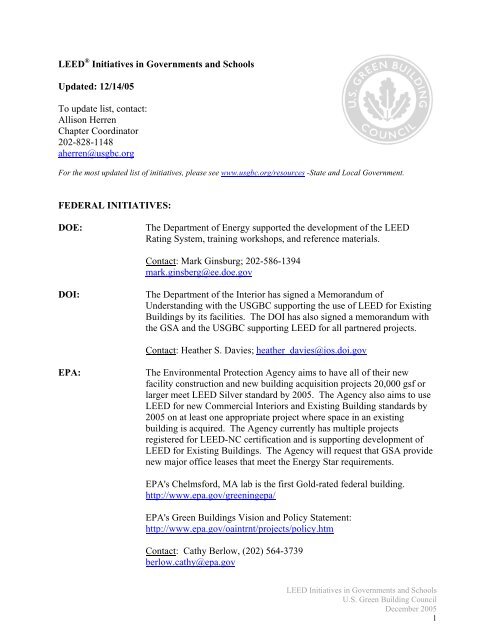
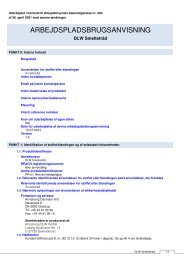
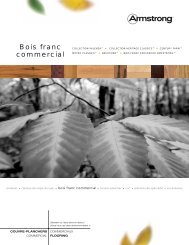
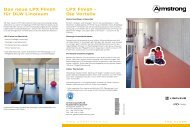
![installation [pdf] - Armstrong](https://img.yumpu.com/21989817/1/164x260/installation-pdf-armstrong.jpg?quality=85)
